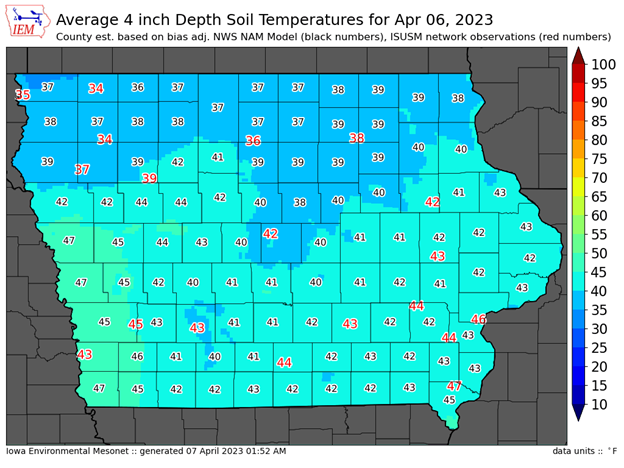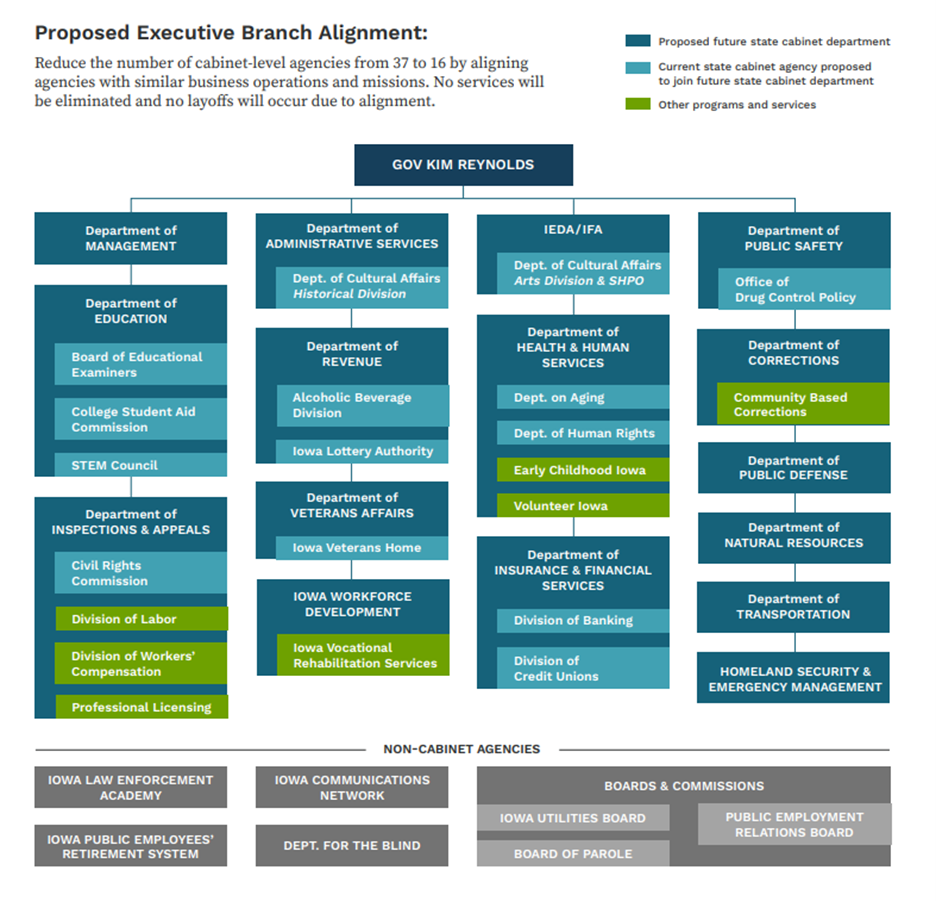Week 13 was quiet at the Capitol, with very little floor action and minimal committee work. During week 13, the Senate could only consider House bills, House joint resolutions, and unfinished business, and the House could only consider Senate bills, Senate joint resolutions, and unfinished business. This is due to the Joint Rule, which allows for chambers to clear calendars of lingering policy issues.
The path to sine die is not clear, but it is obvious we are on the cusp of winding down session with the primary focus turning to the state budget (see more on the budget below). On Tuesday, the Governor signed Government Reorganization into law, allowing for the implementation of the reorganization to begin in earnest and for FY 2024 budgets to reflect the reorganizations.
Several major policy issues linger beyond the funnel and leadership will have to work out a gameplan for how (and if) to resolve these issues, with just 21 days (15 business days) remaining until the scheduled 110th day of session on April 28. If a policy bill has not made its way to the unfinished business calendar at this point, there are few options for language in those bills to advance.
Soil Temperature
Two leading indicators as to when the Iowa General Assembly will adjourn for the year are the appropriations process and soil temperature.
Like most states, Iowa’s legislative calendar is based on the planting and growing season. The legislature convenes in January and typically adjourns in April or early May. During this time the soil is either frozen over or too cold to plant. But, as spring arrives, the soil temperature begins to increase, as does the pressure on the legislators who are farmers (of which there are many) to get out in the field and plant.
According to Iowa State University Soil Monitoring, the current soil temperatures around the state are still in the mid to upper 30s in the north and into the low 40s in the south. It is recommended to begin planting corn and soybeans when the soil temperature is at 50 degrees Fahrenheit.
There is still much of the appropriations process ahead, and the ground is too cold to pressure the farmer legislators to push for adjournment. Based on these leading indicators, sine die is not quite in sight. Your Dentons Davis Brown team will continue to track both factors closely.

Legislative Activity
Education, Parental Rights, and School Transparency
The House amended and approved the Governor’s education omnibus bill (SF 496) on a 55-42 vote and returned it to the Senate for reconsideration of the bill as amended. Six Republicans (Bergan, Harris, Ingels, Jones, Lohse, and H. Wilz) voted with Democrats against the bill.
Some language in the amendment version had previously cleared the House, while some language is new. The bill includes language on the following:
- “Age-appropriate” books in schools
- Prohibition of curriculum discussing sexual orientation or gender identity in K-6 classrooms
- Placing parents on the Board of Educational Examiners
- New pathways for teacher licensure
- Mandatory reporting if a student expresses their gender identity is different than assigned at birth
- Removal of education about AIDS and the HPV vaccine
As passed by the Senate, the Legislative Services Agency (LSA) estimated that about 6% of school districts would need to upgrade software for learning transparency provisions at about $38,000, and about half of the schools would need library software updates at about $16,000. Schools were also expected to hire additional substitutes or to need to add additional contract days for teachers to prepare materials for posting, with cost estimates between $6 million and $30 million for substitutes and between $12 and $60 million for additional contract hours. The LSA has not yet evaluated the fiscal impact of SF 496 with the amendments.
While many of these issues have been a priority for a number of individual legislators, it is unclear whether the Senate will accept the amended version of SF 496. We anticipate some version of the Education, Parental Rights, and School Transparency bill to make it to the Governor’s desk this session.
SNAP
The bill to add asset testing to the Supplemental Nutrition Assistance Program (SNAP) moves forward. If passed, SF 494 would require Iowa families on SNAP to have a maximum of $15,000 in assets to remain eligible for the program and would create a new software system for the Health and Human Services (HHS) Department to verify families’ income, assets, and identities.
Republicans said the measure is necessary to combat the fraudulent use of public benefit programs. Democrats and opponents to the bill said this fraud isn’t happening in Iowa and the changes will prevent Iowans who are legitimately in need from accessing public assistance for food.
The LSA estimates that about 1% of current recipients, (8,000 Medicaid members, 2,800 SNAP recipients, and 600 children receiving health insurance) will lose their coverage or benefits under the bill. The Iowa Workforce Development expects an annual cost increase of about $70,000. In FY 2025 and FY 2026, HHS expects staff and technology costs will increase by about $7.5 million in total. When fully implemented in FY 2028, the LSA estimates that the bill will reduce Medicaid, SNAP, and CHIP benefits by about $65 million, with $11 million of that being the share paid by the state.
The Senate passed the bill on a party-line vote at the end of March; approval by the House will send SF 494 down to the Governor for her signature.
Budget Update
The budget process has begun in earnest, though not in a conventional manner. On Monday, the Senate Appropriations Committee approved four of the budget shell bills: Administration and Regulation, Agriculture and Natural Resources, Economic Development, and Education; and on Tuesday, three more budget shell bills passed the Senate Appropriations Committee: HHS, Justice System, and Judicial Branch appropriations.
These bills do not include any actual appropriations; appropriations have yet to be determined by leadership and budget chairs. We expect those conversations to be ongoing as the Senate works to establish its budget targets.
The House has taken a more conventional approach, releasing budget targets:
- Administration & Regulation – $70,488,763
- Agriculture and Natural Resources – $43,544,227
- Economic Development – $42,113,893
- Education – $984,921,856
- Health and Human Services – $2,135,383,594
- Judicial Branches and Justice Systems – $885,843,753
- State Aid to Schools & Standing Appropriations – $4,416,801,866
The House proposes spending $8.58 billion in FY 2024, an increase of 4.5% from the current year. This proposal is about $90 million more than the Governor’s budget and the Senate GOP’s proposed budget ($8.486 billion).
Once chambers establish their budgets, leaders and budget chairs will need to engage in negotiations to finalize a statewide budget for FY 2024. How quickly they can work through the $90 million difference will be one of the major factors determining when session will come to a close, as well as what major policy issues may be resolved via the budgeting process.
| Budget | House | Senate | Status |
| Admin & Reg | SF 557 (SSB1209) | 04/03/2023 Committee report approving bill, renumbered. | |
| Ag & Natural Resources | SF 558 (SSB1210) | 04/03/2023 Committee report approving bill, renumbered. | |
| EcoDevo | SF 559 (SSB1211) | 04/03/2023 Committee report approving bill, renumbered. | |
| Education | SF 560 (SSB1212) | 04/03/2023 Committee report approving bill, renumbered. | |
| HHS / Veterans | SF 561 (SSB1213) | 04/04/2023 Committee report approving bill, renumbered. | |
| Infrastructure | |||
| Justice System | SF 562 (SSB1214) | 04/04/2023 Committee report approving bill, renumbered. | |
| Judicial Branch | SF 563 (SSB1215) | 04/04/2023 Committee report approving bill, renumbered. | |
| Transportation |
Executive Branch Update
Gov. Reynolds Signs SF 514 into Law
Senate File 514 reorganizes the executive branch structure, operations, and personnel to reduce the total number of cabinet-level departments from 37 to 16. Below find the executive branch alignment chart, which will be implemented immediately.

$8.3 Million Toward Water Conservation Efforts
Gov. Kim Reynolds announced that $8.3 million in matching grants have been awarded to assist five companies in upgrading water infrastructure at Iowa manufacturing and industrial facilities in Boone, Davenport, Dubuque, and Fort Dodge. The awards were made through Iowa’s Water Infrastructure Fund (WIF).
The funds will assist in upgrading systems to reduce the heavy demand placed on the state’s surface and groundwater resources and will lessen the local utility’s need to treat wastewater that is used for industrial purposes.
Iowa has a long history of innovation to improve water quality and sustainability, and these projects continue that legacy,” said Gov. Reynolds. “We rely on our land and water to provide for Iowa’s future generations, which is why we remain focused on protecting, preserving, and restoring Iowa’s water resources.
These awards are part of Gov. Reynolds’ historic $100 million investment in water infrastructure and water quality efforts for the State of Iowa aimed at reducing excess nutrients, improving public health, promoting the reuse of water and wastewater, and providing significant economic benefits to communities and the state.
Damaging Weekend Storms
Governor Reynolds issued two disaster proclamations this weekend due to the damage caused by storms in Iowa on Friday. The first proclamation allows residents in 12 affected counties to use the Iowa Individual Assistance Grant Program, which provides grants of up to $5,000 for qualifying households, and the Disaster Case Management Program, which helps with the creation of disaster recovery plans and referrals to obtain services. The second proclamation suspends various rules on the movement of loads for disaster repairs and the hours of service for crews for April. Six more counties in southeast Iowa were added in another disaster proclamation.
Bills Signed by Governor
At the end of Week 13, 30 bills have been enrolled and sent down to the Governor, eleven of these await her signature. Nineteen bills have been signed into law by the Governor to date. A complete list of enrolled bills and enactment dates can be found here.
| Bill | Description | Signed by the Governor |
| HF 68 | Establishing an Educational Savings Account Program in Iowa | 1/24/2023 |
| SF 192 | Establishing SSA (School Supplemental Aid) for FY 2024 | 2/7/2023 |
| SF 153 | Single trip permits for a vehicle of excessive size in emergencies | 2/15/2023 |
| HF 161 | Limitations on damages in medical malpractice | 2/16/2023 |
| SF 181 | Property tax calculation fix for residential assessments | 2/20/2023 |
| HF 113 | Child welfare representation | 03/22/2023 |
| HF 133 | Voluntary debt cancellation notice | 03/22/2023 |
| HF 202 | Makes it a serious misdemeanor to use fire, destructive devices, or explosives recklessly to endanger property or safety. | 03/22/2023 |
| HF 205 | Barrel tax revenues collected on beer | 03/22/2023 |
| HF 257 | Strikes the current list of third-party CDL testers and authorizes the DOT to adopt rules restricting the scope of third-party testers. | 03/22/2023 |
| HF 337 | Allows the use of any federally approved refrigerant so long as the refrigerant is used according to federal safety standards. | 03/22/2023 |
| SF 154 | Adds specified hydro-excavation equipment to the list of vehicles exempt from size, weight, load, and permit requirements. | 03/22/2023 |
| SF 157 | Authorizes certain persons to administer the final field test of an approved driver education course. | 03/22/2023 |
| SF 482 | Prohibits a person from using a toilet that does not correspond to the person’s biological sex in K-12 schools. | 03/22/2023 |
| SF 75 | Affects ambulatory surgical centers and rural emergency hospitals. | 03/28/2023 |
| SF 262 | Creates consumer data protections and provides civil penalties. | 03/28/2023 |
What’s next?
Budget season is upon us. We can expect to see budget work begin in earnest as Leaders and Chairs dial-in budget targets.
Additionally, Republican lawmakers may focus their energy on finalizing a proposal on taxes/property tax reform in the coming weeks, which has been a top priority since the start of session. House and Senate leadership have not yet worked out a unified proposal. Senator Dan Dawson and Representative Bobby Kauffman have each introduced property tax legislation and will need to agree on a bill to send to the Governor if anything related to property taxes is going to move this year.
Tax reform, pipelines, and budgeting are likely to be the highlights in the coming weeks and in final negotiations leading up to (or past) the scheduled 110th Day of Session on April 28.
The full 2023 Session Timetable can be found here.


